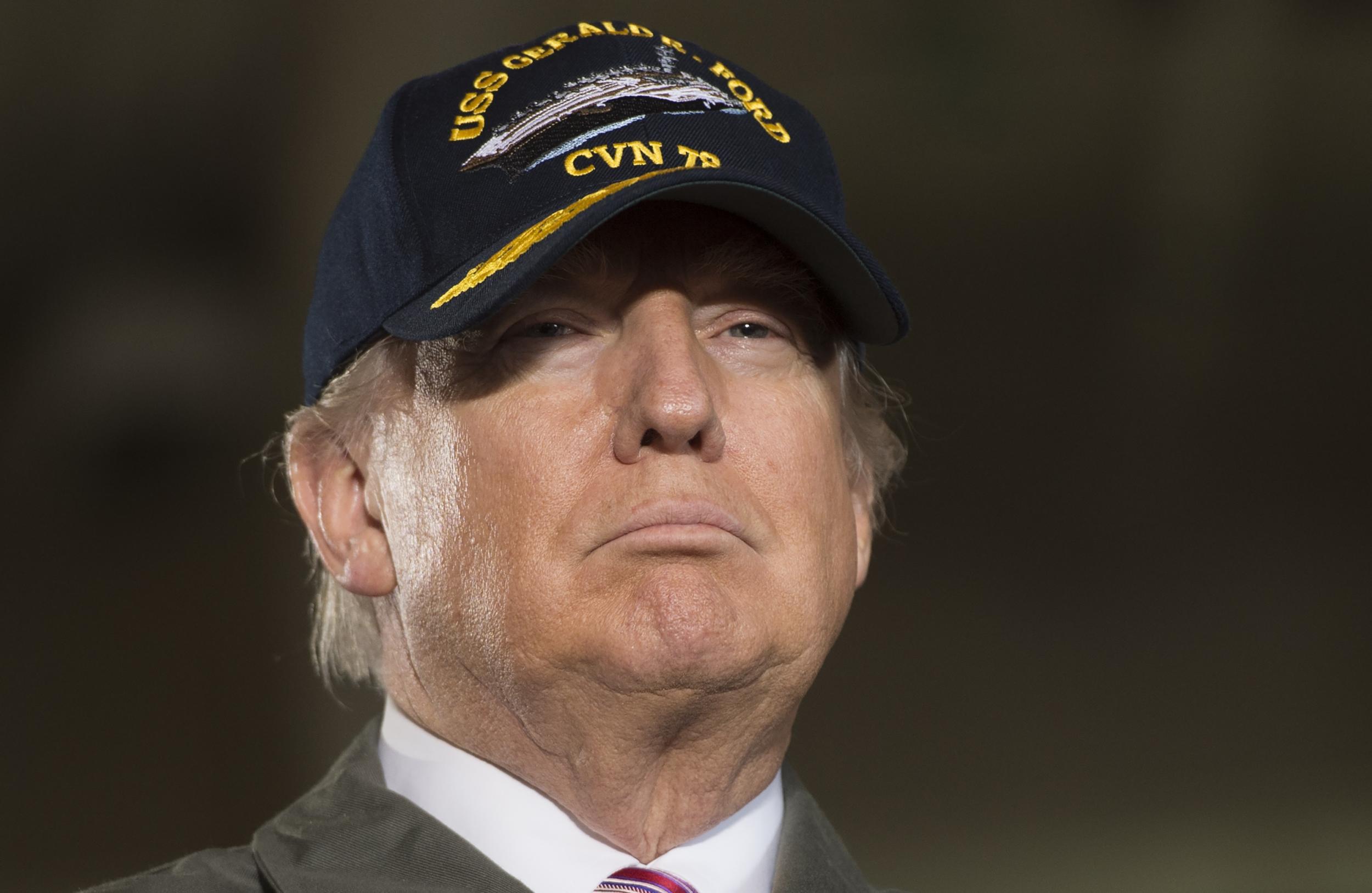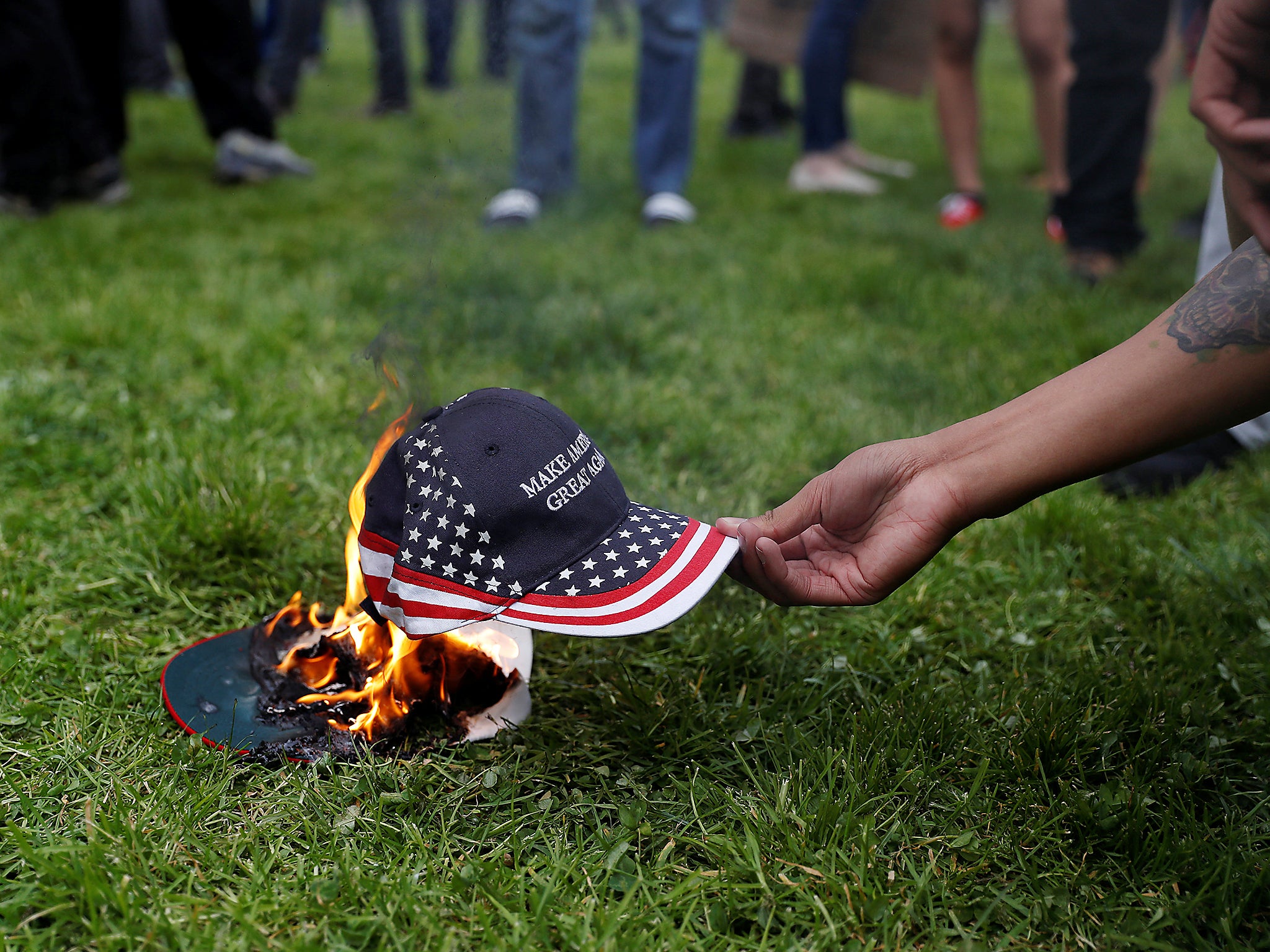Inside Trump's fury: The President rages at leaks, setbacks and accusations
'I haven't seen him this angry'

Your support helps us to tell the story
From reproductive rights to climate change to Big Tech, The Independent is on the ground when the story is developing. Whether it's investigating the financials of Elon Musk's pro-Trump PAC or producing our latest documentary, 'The A Word', which shines a light on the American women fighting for reproductive rights, we know how important it is to parse out the facts from the messaging.
At such a critical moment in US history, we need reporters on the ground. Your donation allows us to keep sending journalists to speak to both sides of the story.
The Independent is trusted by Americans across the entire political spectrum. And unlike many other quality news outlets, we choose not to lock Americans out of our reporting and analysis with paywalls. We believe quality journalism should be available to everyone, paid for by those who can afford it.
Your support makes all the difference.President Donald Trump spent the weekend at "the winter White House," Mar-a-Lago, the secluded Florida castle where he is king. The sun sparkles off the glistening lawn and warms the russet clay Spanish tiles, and the steaks are cooked just how he likes them (well done). His daughter Ivanka and son-in-law Jared Kushner - celebrated as calming influences on the tempestuous president - joined him. But they were helpless to contain his fury.
Trump was mad - steaming, raging mad.
Trump's young presidency has existed in a perpetual state of chaos. The issue of Russia has distracted from what was meant to be his most triumphant moment: his address last Tuesday to a joint session of Congress. And now his latest unfounded accusation - that Barack Obama tapped Trump's phones during last fall's campaign - had been denied by the former president and doubted by both allies and fellow Republicans.
When Trump ran into Christopher Ruddy on the golf course and later at dinner Saturday, he vented to his friend. "This will be investigated," Ruddy recalled Trump telling him. "It will all come out. I will be proven right."
"He was pissed," said Ruddy, the chief executive of Newsmax, a conservative media company. "I haven't seen him this angry."
Trump enters week seven of his presidency the same as the six before it: enmeshed in controversy while struggling to make good on his campaign promises. At a time when the White House had sought to ride the momentum from Trump's speech to Congress and begin advancing its agenda on Capitol Hill, the administration finds itself beset yet again by disorder and suspicion.
At the center of the turmoil is an impatient president increasingly frustrated by his administration's inability to erase the impression that his campaign was engaged with Russia, to stem leaks about both national security matters and internal discord and to implement any signature achievements.
This account of the administration's tumultuous recent days is based on interviews with 17 top White House officials, members of Congress and friends of the president, many of whom requested anonymity to speak candidly.
Gnawing at Trump, according to one of his advisers, is the comparison between his early track record and that of Obama in 2009, when amid the Great Recession he enacted an economic stimulus bill and other big-ticket items.
Trump's team is trying again to reboot this week, with the president expected to sign a new executive order Monday implementing a travel ban for some countries after the initial one was blocked in federal court. The administration also intends to introduce a legislative plan later in the week to repeal and replace Obama's health-care law, officials said.
The rest of Trump's legislative plan, from tax reform to infrastructure spending, is effectively on hold until Congress first tackles the Affordable Care Act.
White House legislative staffers concluded late last week that the administration was spinning in circles on the health-care plan, amid mounting criticism from conservatives that the administration was fumbling.
With Health and Human Services Secretary Tom Price on the road with Vice President Mike Pence, a decision was made: Mick Mulvaney, director of the Office of Management and Budget, would become the point person, though officials insisted Price had not been sidelined.
On Friday, Mulvaney convened a meeting at the Eisenhower Executive Office Building with top administration officials and senior staff of House and Senate leaders to hammer out the final details of the proposal to replace the Affordable Care Act.
"Mulvaney has been essential in helping us get health care over the finish line," said Marc Short, the White House legislative affairs director.
On Capitol Hill, Price is seen by some Republicans as more knowledgeable about health-care policy than Mulvaney, given his experience as a physician and his time as chairman of the House Budget Committee. But Mulvaney benefits from the close relationships he has forged with Trump's top advisers and with the House's conservative wing.

Trump, meanwhile, has been feeling besieged, believing that his presidency is being tormented in ways known and unknown by a group of Obama-aligned critics, federal bureaucrats and intelligence figures - not to mention the media, which he has called "the enemy of the American people."
That angst over what many in the White House call the "deep state" is fermenting daily, fueled by rumors and tidbits picked up by Trump allies within the intelligence community and by unconfirmed allegations that have been made by right-wing commentators. The "deep state" is a phrase popular on the right for describing entrenched networks hostile to Trump.
Rep. Dana Rohrabacher, R-Calif., an advocate of improved relations between the United States and Russia, said he has told friends in the administration that Trump is being punished for clashing with the hawkish approach toward Russia that is shared by most Democrats and Republicans.
"Remember what Dwight Eisenhower told us: There is a military-industrial complex. That complex still exists and has a lot of power," he said. "It's everywhere, and it doesn't like how Trump is handling Russia. Over and over again, in article after article, it rears its head."
The president has been seething as he watches round-the-clock cable news coverage. Trump recently vented to an associate that Carter Page, a onetime Trump campaign adviser, keeps appearing on television even though he and Trump have no significant relationship.
Stories from Breitbart News, the incendiary conservative website, have been circulated at the White House's highest levels in recent days, including one story where talk-radio host Mark Levin accused the Obama administration of mounting a "silent coup," according to several officials.
Stephen Bannon, the White House chief strategist who once ran Breitbart, has spoken with Trump at length about his view that the "deep state" is a direct threat to his presidency.
Advisers pointed to Bannon's frequent closed-door guidance on the topic and Trump's agreement as a fundamental way of understanding the president's behavior and his willingness to confront the intelligence community - and said that when Bannon spoke recently about the "deconstruction of the administrative state," he also was alluding to his aim of rupturing the intelligence community and its influence on the U.S. national-security and foreign-policy consensus.
Bannon's view is shared by some top Republicans.
"It's not paranoia at all when it's actually happening. It's leak after leak after leak from the bureaucrats in the [intelligence community] and former Obama administration officials - and it's very real," said Rep. Devin Nunes, R-Calif., the chairman of the House Intelligence Committee. "The White House is absolutely concerned and is trying to figure out a systemic way to address what's happening."
The mood at the White House on Tuesday night was different altogether - jubilant. Trump returned from the Capitol shortly before midnight to find his staff assembled in the residence cheering him. Finally, they all thought, they had seized control. The president had even laid off Twitter outbursts - a small victory for a staff often unable to drive a disciplined message.
"He nailed it, and he knew it," said Kellyanne Conway, counselor to the president.
The merriment came to a sudden end on Wednesday night, when The Washington Post first reported that Attorney General Jeff Sessions met with the Russian ambassador despite having said under oath at his Senate confirmation hearing that he had no contact with the Russians.
Inside the West Wing, Trump's top aides were furious with the defenses of Sessions offered by Justice Department's public affairs division and felt blindsided that Sessions's aides had not consulted the White House earlier in the process, according to one senior White House official.
The next morning, Trump exploded, according to White House officials. He headed to Newport News, Va., on Thursday for a splashy commander-in-chief moment. The president would trumpet his plan to grow military spending aboard the Navy's sophisticated new aircraft carrier. But as Trump, sporting a bomber jacket and Navy cap, rallied sailors and shipbuilders, his message was overshadowed by Sessions.
Then, a few hours after Trump had publicly defended his attorney general and said he should not recuse himself from the Russia probe, Sessions called a news conference to announce just that - amounting to a public rebuke of the president.
Back at the White House on Friday morning, Trump summoned his senior aides into the Oval Office, where he simmered with rage, according to several White House officials. He upbraided them over Sessions's decision to recuse himself, believing that Sessions had succumbed to pressure from the media and other critics instead of fighting with the full defenses of the White House.
In a huff, Trump departed for Mar-a-Lago, taking with him only his daughter and Kushner, who is a White House senior adviser. His top two aides, Chief of Staff Reince Priebus and Bannon, stayed behind in Washington.
As reporters began to hear about the Oval Office meeting, Priebus interrupted his Friday afternoon schedule to dedicate more than an hour to calling reporters off the record to deny that the outburst had actually happened, according to a senior White House official.
"Every time there's a palace intrigue story or negative story about Reince, the whole West Wing shuts down," the official said.
Ultimately, Priebus was unable to kill the story. He simply delayed the bad news, as reports of Trump dressing down his staff were published by numerous outlets Saturday.
Trouble for Trump continued to spiral over the weekend. Early Saturday, he surprised his staff by firing off four tweets accusing Obama of a "Nixon/Watergate" plot to tap his Trump Tower phones in the run-up to last fall's election. Trump cited no evidence, and Obama's spokesman denied ordering any such wiretap.
That night at Mar-a-Lago, Trump had dinner with Sessions, Bannon, Homeland Security Secretary John Kelly and White House senior policy adviser Stephen Miller, among others. They tried to put Trump in a better mood by going over their implementation plans for the travel ban, according to a White House official.
Trump was brighter Sunday morning as he read several newspapers, pleased that his allegations against Obama were the dominant story, the official said.
But he found reason to be mad again: Few Republicans were defending him on the Sunday political talk shows. Some Trump advisers and allies were especially disappointed in Sen. Marco Rubio, Fla., who two days earlier had hitched a ride down to Florida with Trump on Air Force One.
Pressed by NBC's Chuck Todd to explain Trump's wiretapping claim, Rubio demurred.
"Look, I didn't make the allegation," he said. "I'm not the person that went out there and said it."
(c) 2017, The Washington Post
Join our commenting forum
Join thought-provoking conversations, follow other Independent readers and see their replies
Comments